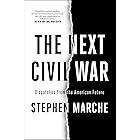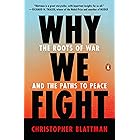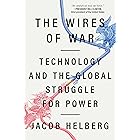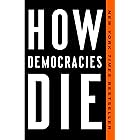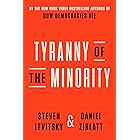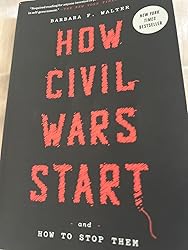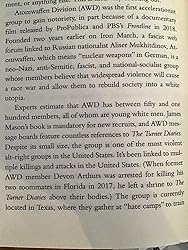| Kindle Price: | $12.99 |
| Sold by: | Random House LLC Price set by seller. |
Your Memberships & Subscriptions

Download the free Kindle app and start reading Kindle books instantly on your smartphone, tablet, or computer - no Kindle device required.
Read instantly on your browser with Kindle for Web.
Using your mobile phone camera - scan the code below and download the Kindle app.

OK
 Audible sample Sample
Audible sample Sample 


How Civil Wars Start: And How to Stop Them Kindle Edition
“Required reading for anyone invested in preserving our 246-year experiment in self-government.”—The New York Times Book Review (Editors’ Choice)
WINNER OF THE GLOBAL POLICY INSTITUTE AWARD • THE SUNDAY TIMES BOOK OF THE YEAR • ONE OF THE BEST BOOKS OF THE YEAR: Financial Times, The Times (UK), Esquire, Prospect (UK)
Political violence rips apart several towns in southwest Texas. A far-right militia plots to kidnap the governor of Michigan and try her for treason. An armed mob of Trump supporters and conspiracy theorists storms the U.S. Capitol. Are these isolated incidents? Or is this the start of something bigger? Barbara F. Walter has spent her career studying civil conflict in places like Iraq, Ukraine, and Sri Lanka, but now she has become increasingly worried about her own country.
Perhaps surprisingly, both autocracies and healthy democracies are largely immune from civil war; it’s the countries in the middle ground that are most vulnerable. And this is where more and more countries, including the United States, are finding themselves today.
Over the last two decades, the number of active civil wars around the world has almost doubled. Walter reveals the warning signs—where wars tend to start, who initiates them, what triggers them—and why some countries tip over into conflict while others remain stable. Drawing on the latest international research and lessons from over twenty countries, Walter identifies the crucial risk factors, from democratic backsliding to factionalization and the politics of resentment. A civil war today won’t look like America in the 1860s, Russia in the 1920s, or Spain in the 1930s. It will begin with sporadic acts of violence and terror, accelerated by social media. It will sneak up on us and leave us wondering how we could have been so blind.
In this urgent and insightful book, Walter redefines civil war for a new age, providing the framework we need to confront the danger we now face—and the knowledge to stop it before it’s too late.
- LanguageEnglish
- PublisherCrown
- Publication dateJanuary 11, 2022
- File size1862 KB
Customers who bought this item also bought
 Two variables—anocracy and factionalism—predicted better than anything else where civil wars were likely to break out.Highlighted by 1,174 Kindle readers
Two variables—anocracy and factionalism—predicted better than anything else where civil wars were likely to break out.Highlighted by 1,174 Kindle readers Experts call countries in this middle zone “anocracies”—they are neither full autocracies nor democracies but something in between.Highlighted by 1,120 Kindle readers
Experts call countries in this middle zone “anocracies”—they are neither full autocracies nor democracies but something in between.Highlighted by 1,120 Kindle readers For a decaying democracy, the risk of civil war increases almost the moment it becomes less democratic.Highlighted by 694 Kindle readers
For a decaying democracy, the risk of civil war increases almost the moment it becomes less democratic.Highlighted by 694 Kindle readers
From the Publisher

|
|
|
|
|---|---|---|
|
|
|
|
Editorial Reviews
Review
“How Civil Wars Start is a stop sign for us—and an imperative book for our time. The evidence-based preventative measures could not be more urgent. Read and act.”—Ibram X. Kendi, author of How to Be an Antiracist
“[A] bracing manual . . . Walter’s book lays out America’s possible roads to dystopia with impressive concision. Her synthesis of the various barometers of a country heading to civil war is hard to refute when applied to the U.S. . . . Indispensable.”—Financial Times
“Like those who spoke up clearly about the dangers of global warming decades ago, Walter delivers a grave message that we ignore at our peril.”—The New Yorker
“Rigorously researched and lucidly argued, How Civil Wars Start is an arresting wake-up call.”—Esquire
“As a political scientist who has spent her career studying conflicts in other countries, [Walter] approaches her work methodically, patiently gathering her evidence before laying out her case.”—The New York Times
“I’ve been skeptical of the notion that the United States is on the verge of another civil war. Walter has made me reconsider. . . . This is a book that everyone in power should read immediately.”—The Washington Post
“The popular theory that the world is becoming more peaceful is an illusion. This is a clearly written and enormously important book. Be afraid.”—The Times(U.K.)
“One of the year’s most persuasively pessimistic books.”—Prospect magazine
“Drawing on her deep understanding of the causes of intra-state violence . . . Barbara F. Walter argues, chillingly, that many of the conditions that commonly precede civil wars are present today in the United States.”—Steven Levitsky and Daniel Ziblatt, authors of How Democracies Die
“How Civil Wars Start is a sobering but engrossing book. It is so tempting to ignore or deny Walter’s carefully researched and reasoned conclusions, which is precisely the response she is warning us against. . . . Highly recommended for anyone interested in preserving American democracy.”—Anne-Marie Slaughter, president and CEO, New America
“This engaging book from one of the country’s most authoritative scholars of civil wars is a dire warning. Governing amid diversity is an incredible challenge, and this book is an important guide to preserving our democracy.”—Kori Schake, Director of Foreign and Defense Policy Studies, American Enterprise Institute
“How Civil Wars Start brilliantly illuminates the history of civil wars and the profound dangers to our union today, serving as both a warning about the stakes in our politics and a call to action.”—Ben Rhodes, author of After the Fall
About the Author
Excerpt. © Reprinted by permission. All rights reserved.
The Danger of Anocracy
Noor was a high school sophomore in Baghdad when U.S. forces first attacked Iraq on March 19, 2003. At age thirteen, she had seen her country’s leader, Saddam Hussein, condemn U.S. president George W. Bush on TV for threatening war and had heard her family talking around the dinner table about a possible American invasion. Noor was a typical teenager. She loved Britney Spears and the Backstreet Boys and Christina Aguilera. She would watch Oprah and Dr. Phil in her free time, and one of her favorite films was The Matrix. She couldn’t imagine U.S. soldiers in Baghdad—where life, though sometimes hard, had mainly been about hanging out with friends, walking to the park, and visiting her favorite animals at the zoo. To her, it just felt unreal.
But two weeks later, American soldiers arrived in her part of the city. The first sounds she heard were airplanes and then explosions late in the afternoon. She rushed up to the roof of their house, following her mother and sisters, not knowing what they would find. When she looked up at the sky, she saw armored vehicles floating under parachutes. “It was like a movie,” she said. A few days later, American soldiers walked down the street in front of her house, and Noor ran to the front door to watch them. She saw her neighbors also standing in their doorways, smiles on their faces. The soldiers smiled back, eager to talk to anyone who was willing. “Everybody was so happy,” Noor recalled. “There was suddenly freedom.” Less than a week later, on April 9, her fellow Iraqis descended on Firdos Square in central Baghdad, where they threw a rope over the enormous statue of Saddam Hussein, and, with the help of American soldiers, tore it down. Noor thought to herself, You know, we can have a new life. A better life.
Life under Saddam had been challenging. Noor’s father had been a government employee, yet like many other Iraqis, the family had little money. Saddam’s failed war against Iran in the 1980s had left Iraq poor and in debt, and things had gotten only worse in 1990 after he invaded Kuwait and economic sanctions were imposed. Noor’s family, like most Iraqi families, struggled with rampant inflation, a crumbling healthcare system, and shortages of food and medicine. They also lived in fear. Iraqis were forbidden to talk politics or to criticize their government. They came to believe that the walls had ears, and that Saddam’s security services were constantly watching. Saddam had been brutal to his enemies and rivals during his twenty-four-year reign. Iraqis who criticized the president, his entourage, or his Baath Party could be put to death. Journalists were executed or forced into exile. Some dissidents were imprisoned; others simply disappeared. People heard stories of how prisoners were tortured—their eyes gouged out, their genitals electrocuted—then killed via hanging, decapitation, or by firing squad.
But now the Americans had come, and eight months after Iraqi citizens dragged Saddam’s statue to the ground, U.S. soldiers found the fearsome dictator hiding in an eight-foot-deep hole near his hometown of Tikrit. He looked dirty and dazed. With Americans in charge, most Iraqis believed that their country would be reborn and that they would experience the freedom and opportunities available in Western countries. Families dreamed of experiencing true democracy. The military, and perhaps the judiciary, would be reformed. Corruption would end. Wealth, including oil profits, would be distributed more equally. Noor and her family were excited for independent newspapers and satellite TV. “We thought we would breathe freedom, we would become like Europe,” said Najm al-Jabouri, a former general in Saddam’s army. They were wrong.
When Saddam Hussein was captured, researchers who study democratization didn’t celebrate. We knew that democratization, especially rapid democratization in a deeply divided country, could be highly destabilizing. In fact, the more radical and rapid the change, the more destabilizing it was likely to be. The United States and the United Kingdom thought they were delivering freedom to a welcoming population. Instead, they were about to deliver the perfect conditions for civil war.
Iraq was a country plagued by political rivalries, both ethnic and religious. The Kurds, a large ethnic minority in the north, had long fought Saddam for autonomy; they wanted to be left alone to rule themselves. The Shia, who made up more than 60 percent of Iraq’s population, resented being ruled by Saddam Hussein, a Sunni, and his mostly Sunni Baath Party. Over decades, Saddam had been able to consolidate power for his minority group by stacking government positions with Sunnis, requiring everyone to join the Baath Party to qualify for jobs regardless of religion or sect, and by unleashing his murderous security forces on everyone else.
A mere two and a half months after the invasion, Iraqis coalesced into competing sectarian factions, dictated in part by two fateful decisions by the U.S. government. In an effort to bring rapid democracy to the country, Paul Bremer, the head of the United States’ transitional government in Iraq, outlawed the Baath Party and ordered that all members of Saddam Hussein’s government, almost all of whom were Sunni, be permanently removed from power. He then disbanded the Iraqi military, sending hundreds of thousands of Sunni soldiers home.
Suddenly, before a new government could be formed, tens of thousands of Baath bureaucrats were thrown out of power. More than 350,000 officers and soldiers in the Iraqi military no longer had an income. More than 85,000 regular Iraqis, including schoolteachers who had joined the Baath Party as a condition of their employment, lost their jobs. Noor, who is Sunni, remembers the feeling of shock around the country.
Those who had been locked out of power under Saddam, however, saw their opportunity. Political jostling broke out almost immediately among figures such as Nouri al-Maliki, a Shia dissident who had returned from exile, and Muqtada al-Sadr, a radical Shia cleric who wanted Iraq to become an Islamic regime. Though the Americans had hoped to broker a power-sharing agreement among Sunnis, Shiites, and Kurds, they soon acquiesced to the demands of Maliki, who wanted a government that, like the population, was majority Shia. For Noor, what resulted wasn’t democracy. It was chaos followed by a power grab.
Regular Iraqis, especially Sunnis, began to worry. If the more numerous Shia were in control of the government, what would prevent them from turning on the minority Sunnis? What incentives would they have to give them jobs, or share critical oil revenues? What would keep them from exacting revenge for Saddam’s past crimes? Former Baathist party leaders, intelligence officials, and Iraqi army officers, along with Sunni tribal chiefs, soon realized that if they wanted to retain any power in the new democracy, they had to act fast. Nascent insurgent organizations began to form as early as the summer of 2003. They found easy recruits in Sunni cities and Iraq’s Sunni-dominated countryside where citizens increasingly felt politically and economically aggrieved. As one Sunni citizen noted, “We were on top of the system. We had dreams. Now we are the losers. We lost our positions, our status, the security of our families, stability.”
Sunni insurgents didn’t go after American troops at first (the Americans were too well armed). Instead, the insurgents focused on easier targets: those individuals and groups who were helping the Americans. This included the Shia who enlisted in the new Iraqi security forces, Shia politicians, and international organizations, including the United Nations. The insurgents’ goal was to reduce or eliminate support for the U.S. occupation and isolate the American military. It was only afterward that the insurgents began to target American troops, planting inexpensive but highly effective roadside bombs along important supply routes. By the time Saddam Hussein was captured in December 2003, guerrilla war had broken out.
The fighting escalated in April 2004 when Shia factions began to compete for power. The most notorious was a Shia militia led by Muqtada al-Sadr, a radical Shia cleric who played on Shia nationalists’ anger at U.S. occupation to gain support. He, too, targeted American allies and troops in order to convince the Americans to leave. By the time Iraq’s first parliamentary elections were held, in January 2005, it was clear that Sunnis would play, at best, only a secondary role in government. Some hoped the Americans would step in to strengthen the constitution, or rein in Maliki. But the Americans had become worried about their long-term entanglement in Iraq and did little to intervene. As acts of violence toward coalition forces continued to escalate, so did fighting among Iraqis, who fractured into dozens of regional and religious militias to try to gain control of the country. Many had the support of the local population and received money and weapons from foreign rivals. “Saudi Arabia supported the Sunni militias, and Iran supported the Shia militias, and then you had Muqtada al-Sadr, who promoted himself,” recalled Noor. “People everywhere started taking sides.”
Product details
- ASIN : B095MMDWBR
- Publisher : Crown (January 11, 2022)
- Publication date : January 11, 2022
- Language : English
- File size : 1862 KB
- Text-to-Speech : Enabled
- Screen Reader : Supported
- Enhanced typesetting : Enabled
- X-Ray : Not Enabled
- Word Wise : Enabled
- Sticky notes : On Kindle Scribe
- Print length : 306 pages
- Best Sellers Rank: #149,432 in Kindle Store (See Top 100 in Kindle Store)
- #38 in Democracy (Kindle Store)
- #45 in Violence in Society (Kindle Store)
- #135 in History of Individual Wars
- Customer Reviews:
About the author

Barbara F. Walter, Ph.D., is the Rohr Professor of International Affairs at the School of Global Policy & Strategy at the University of California, San Diego. She received her Ph.D from the University of Chicago and completed post docs at the Olin Institute for Strategic Studies at Harvard University and the War and Peace Institute at Columbia University.
Walter is one of the world's leading experts on civil wars, political violence, and terrorism. Walter is a permanent member of the Council on Foreign Relations, a frequent live guest on CNN, and an active consultant for the World Bank, the United Nations, and the Departments of Defense and State. She occasionally writes for the Washington Post, the Wall Street Journal, and the Los Angeles Times, and is very happy when her research is showcased in the New York Times or the New Yorker, her favorite hometown publications. In 2012, she founded the blog Political Violence @ a Glance (with Erica Chenoweth).
Customer reviews
Customer Reviews, including Product Star Ratings help customers to learn more about the product and decide whether it is the right product for them.
To calculate the overall star rating and percentage breakdown by star, we don’t use a simple average. Instead, our system considers things like how recent a review is and if the reviewer bought the item on Amazon. It also analyzed reviews to verify trustworthiness.
Learn more how customers reviews work on AmazonReviews with images
-
Top reviews
Top reviews from the United States
There was a problem filtering reviews right now. Please try again later.
Dr Walter gives outstanding historical examples and scenarios to prove her different points and to make them easier to understand. Her understanding of post WWII international conflict is, imo, the highest level.
I checked out the book from the local library first, then downloaded the kindle, then I bought a hardcover copy to mark up and flag and keep on the shelf. Finally, I bought a copy and had it sent to my father-in-law.
The book inspired a year of research into the 1850-1861 causes of the American Civil War, as well as the potential for a second American Civil War in the near future.
Herein, however, the book almost falls apart. About halfway through she gives up the academic discussion and switches to a politically progressive viewpoint of current events. She gives a detailed and well-supported illustration of how Trump supporters and famed MegaMaga Republicans are a threat to the govt and the world. The problem is that-unlike the first half where her illustrations are backed by history, in the second half her illustrations of a new civil war are backed in half truths and historical facts that have since been investigated and found to be historically false.
I tried to look past her second half in a way. She presented an aggrieved portion of Americans from the right, and while she did so I kept asking, "What about the left? They protest and burn cities and commit far more damage than the right ever has?" Here I shifted my thought process and when she would say something like "the Trump supporters did xyz" I would stop and ask myself, "What would the other side do in that sitation or if the roles were reversed.?" This thought exercise is what really led me to love the book. According to the reviews, her shift to partisan examples based on half truths and disproven allegations really upset people. It did make it hard to read, but I think to include descriptions of what both sides of the spectrum would do...would just take up too much space. Maybe in her next book?
DEFINITELY GET A COPY
If you believe in American Exceptionalism, you’ll likely discount her analysis as inapplicable to us, to our collective greater peril. But if are of the opinion that people are people regardless of which patch of soil they happen to have been born on, this book will make what we Americans have lately been experiencing fit into a extremely understandable, albeit chilling broader set of patterns.
My only criticism of the book is its lack of references. I like having a textual hyperlink that sends me to the name of a study, etc. in the endnotes when cited. Maybe Amazon could come up with a setting that would toggle those on or off to accommodate either reading style.
What the book does not do, despite some excellent advice on how to prevent democratic disintegration, is to explain why in general the left has not used these same tools to support democracy - naivete? factionalism within the left? There is an excellent chapter about leftist movements adopting similar violent tactics to counter right wing militias but only a small amount of text indicating how in some countries the move torwards democratic disintegration was halted and civil war avoided, and what is happening at the grass roots level in the US to counter right wing threats.
Top reviews from other countries
Reviewed in France on November 8, 2022

Non stupisce trovare gli USA tra le democrazie in fase involutiva, con rischi di guerra civile.
Dopo questa lettura alcuni eventi politici e alcuni fatti di cronaca accendono forti campanelli di allarme.
Fondamentale!





